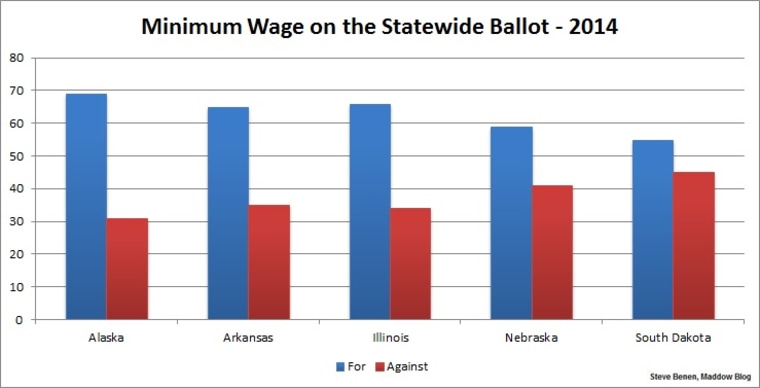
Coloradans hate personhood, so they put a personhood champion in the U.S. Senate. Georgians are heartbroken over being dead last in job growth, so they re-elected their governor and elected a new senator who specializes in outsourcing.
And in a wide variety of states, Americans rallied behind candidates dead set against raising the minimum wage, even while voting to raise the minimum wage.
Voters in four states approved measures Tuesday to raise the minimum wage, The Associated Press projected. The wage increase won its biggest margin of victory in Alaska, where it garnered 69 percent of the vote. In Arkansas, it received 65 percent; in Nebraska, 59 percent approved raising the minimum wage, while in South Dakota, the margin was 53 percent.
The issue was also on the ballot in Illinois, where it passed easily, but the measure was legally considered "advisory" -- it's non-binding on policymakers and is only intended to express public will. Whether Gov.-elect Bruce Rauner (R), who has spoken out against the existence of the minimum wage, intends to take the public's advice seriously remains to be seen.
Taken together, once these new policies take effect, most of the country -- 28 states and the District of Columbia -- will have a higher minimum wage that the federal floor. The New York Times said this dynamic reflects "widespread dissatisfaction with Congress's failure to increase the federal minimum of $7.25."
Perhaps, though voters also took definitive steps to ensure they'll remain dissatisfied for the foreseeable future.
The House will continue to be led by Speaker John Boehner (R-Ohio), who, before he rose to his current post, once said, "I'll commit suicide before I vote on a clean minimum-wage bill." More recently, incoming Senate Majority Leader Mitch McConnell (R-Ky.) promised the Koch brothers and their allies over the summer that if he's promoted, "we're not going to be debating all these gosh darn proposals. That's all we do in the Senate is vote on things like raising the minimum wage."
Most voters, even in conservative red states, think they're wrong about this, but those same voters obviously aren't taking the issue too seriously.
That said, though I doubt GOP leaders will see it this way, the results on these minimum-wage measures are a not-so-subtle reminder that as well as Republicans did yesterday, voters and the party aren't exactly on the same page on some of the nation's most contentious issues.